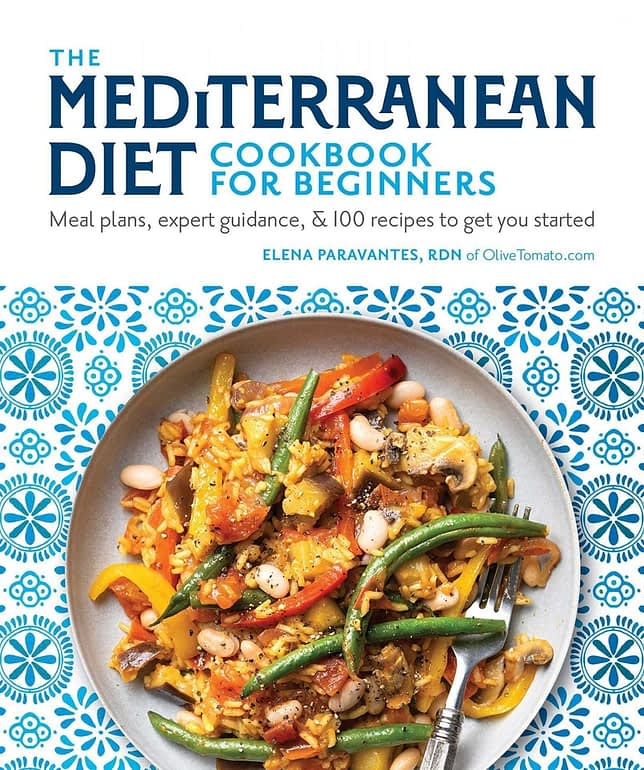A nutritionist and registered dietitian with more than 20 years of experience, Elena Paravantes is known for her love of Mediterranean cuisine.
The Mediterranean Diet Cookbook for Beginners is her new book aimed at presenting the foundations and the unpretentious nature of the region’s renowned eating regime.
It is not about complicated recipes and exotic ingredients. The backbone of my diet – and the Mediterranean diet – is seasonal local vegetables or beans and extra virgin olive oil.
“With this book, I wanted to provide an insider’s guide to the Mediterranean diet and lifestyle,” Paravantes told Olive Oil Times. “It is packed with information that will be useful to anyone who wants to follow an authentic Mediterranean diet,” she added.
See Also:Health NewsBorn and raised in a Greek family, Paravantes had the chance to get a genuine grasp of the Mediterranean way of eating. She naturally developed a taste for authentic Greek-Mediterranean cuisine.
“I come from a family with a long tradition of olive oil production, and I was raised on the Mediterranean diet both in Greece and the United States,” said Paravantes, who has written over 70 articles for Olive Oil Times. “My grandparents and great-grandparents lived way past their 90s following the traditional Greek-Mediterranean diet.”
Boasting 100 recipes and comprehensive food lists, menu plans and cooking techniques, the book, available on Amazon, reflects Paravantes’ firsthand experience with the Mediterranean-style eating pattern.

“The authentic Mediterranean diet is known for its simplicity,” Paravantes said. “This naturally occurring way of eating was based on the available food and, with that in mind, I present the diet as close as possible to the original way of eating.”
The basis of the majority of recipes is vegetables and olive oil. “Many times, we see this diet portrayed with a series of complex recipes with numerous and exotic ingredients, when in fact this diet is based on simple preparations,” the author noted.
“A breakfast can be as simple as a slice of bread, cheese and tomato,” she added. “Of course, there are some special-occasion recipes that require a longer preparation time, but, generally, this way of eating is based on simple but high-quality ingredients.”
Paravantes went to great lengths to pursue the regime’s essentials to illustrate a comprehensive picture of its staple ingredients and cooking techniques.
Her endeavor required research that involved interviews with scientists, residents of the Mediterranean basin, and elders who follow the diet.
“It was important for me to reflect their habits as closely as possible, but also in a realistic way that anyone can follow them from any part of the world,“ she said.
“Some research questions related to the practice of drinking antioxidant herbal tea every day regardless of the season,” she added. “This is an important practice that studies have shown contributes to the health benefits of the diet. Another interesting practice was the intake and foraging of greens and how these were prepared.”
At the same time, Paravantes had the opportunity to clarify the false perceptions and beliefs existing in the field, something that has distressed her ever since she entered the domain of nutrition and dietetics.
“Throughout my career, I noticed plenty of misinformation floating around about the Mediterranean diet and olive oil,” she said.

Elena Paravantes
“I wanted to clear up the misconceptions about the diet I grew up on,” she added. “As a nutritionist and a longtime magazine writer and editor, I made sure that the Mediterranean diet was portrayed correctly.”
Paravantes also had a say about the broader context of the diet. She recognizes that, aside from consuming healthy food, the regime involves a complete life posture, including trivial yet important things.
“The Mediterranean diet may be called a diet, but it is actually a lifestyle that promotes longevity,” Paravantes said.
“Apart from the food, we know that several lifestyle practices also contribute to a sense of wellness as well as longevity,” she added. “Practices such as naps, conviviality, everyday social interactions and having a sense of purpose are outlined in the book with tips on how one can incorporate these practices in their own lives.”
“My philosophy and way of eating are based on the simplicity of the Mediterranean diet,” Paravantes continued. “It is not about complicated recipes and exotic ingredients. My diet’s backbone – and the Mediterranean diet – is seasonal local vegetables or beans and extra virgin olive oil.”
“I build my meal around those two ingredients and accompany it with bread and cheese,” she concluded. “It is that simple.”








